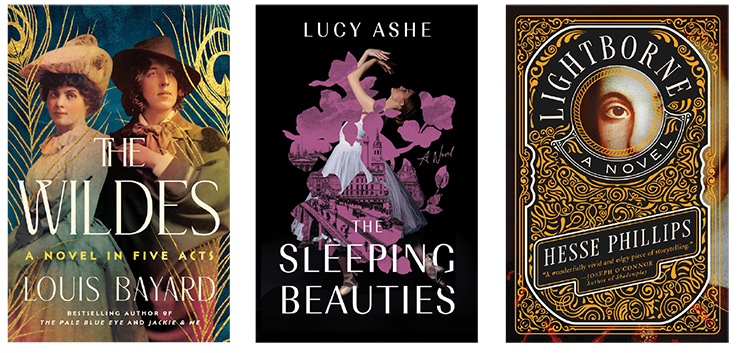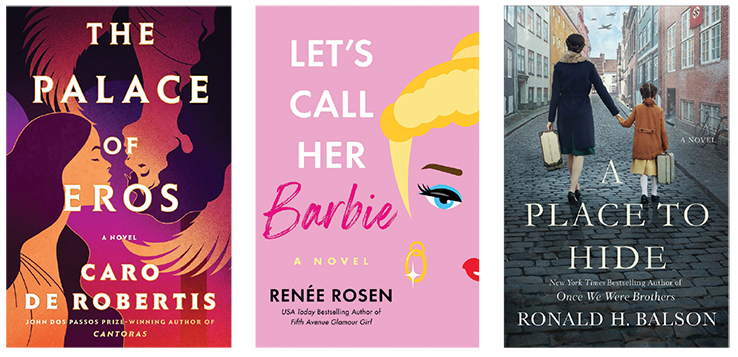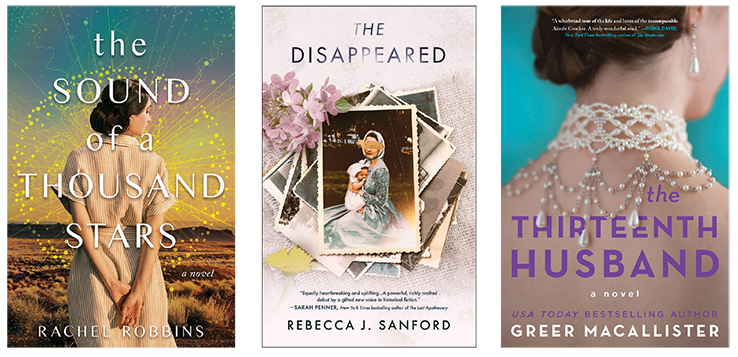Historical Fiction Preview 2024 | The Best Books and Key Trends To Know
Thriving across formats and enthralling audiences, today’s historical fiction is vibrant, on point, and expansive in its scope.
 Journey from the ancient world to the harrowing events of the 20th century. Follow women as they struggle against and change the world. Tread the boards with playwrights and race in the wake of adventurers. It is all possible within the pages of historical fiction. In this year’s preview we dig into the research to showcase trends and titles of note. Key findings? Performing arts are breaking new ground in terms of the subjects authors are exploring, while the larger trends of retellings, genre blends, glitz and glamour, and reclaiming the lives of women castigated or dismissed by history are also front and center.
Journey from the ancient world to the harrowing events of the 20th century. Follow women as they struggle against and change the world. Tread the boards with playwrights and race in the wake of adventurers. It is all possible within the pages of historical fiction. In this year’s preview we dig into the research to showcase trends and titles of note. Key findings? Performing arts are breaking new ground in terms of the subjects authors are exploring, while the larger trends of retellings, genre blends, glitz and glamour, and reclaiming the lives of women castigated or dismissed by history are also front and center.
A downloadable list of all titles mentioned can be found here.
All of History is a Stage
Performing arts is taking the spotlight this season, as figures from the worlds of music, writing, and dance showcase an interest in the creative life. Many know of Maria von Trapp from the Rodgers and Hammerstein musical The Sound of Music, but Michelle Moran lifts the veil on the real person behind the character in Maria: A Novel of Maria von Trapp (Dell). Louis Bayard writes The Wildes: A Novel in Five Acts (Algonquin) to recount the experiences of Oscar Wilde’s wife, Constance, and their sons after the famous playwright’s imprisonment for engaging in a sexual relationship with Lord Alfred Douglas in Victorian England. Separated into five acts and filled with effervescent banter, the novel dips into the depths of desire and being human. The Sleeping Beauties by Lucy Ashe (Union Square & Co.) takes readers into the world of ballet in 1945 London. Briar Woods is a dancer at Sadler’s Wells Ballet when her past comes back to haunt her, and she must give her best performance yet to survive.

Will Power
The artistic focus narrows to Shakespeare (and his cohort) in several ways this season. Kicking it off strong with a feminist Shakespeare-inspired reimagining is Jodi Picoult’s By Any Other Name (Ballantine), which takes place in 1581 and the present. Two women playwrights may be forced to sacrifice their fame by giving writing credit to men so that their plays can be performed onstage. Fully Shakespeare-adjacent, Hesse Phillips’s Lightborne (Pegasus) retells the weeks leading up to Christopher (Kit) Marlowe’s death in Elizabethan England, with a focus on his passionate love affair with someone who might become his killer. Mary McMyne’s A Rose by Any Other Name (Redhook) takes place in 1591 England and brings to life Shakespeare’s sonnets through astrology, magic, the occult, and heated desires.
Shakespeareana combines with two wider trends that LJ has noted for the past several years—retellings of legendary stories, as well as works that reclaim the lives of women from their past historical representation. The most popular Shakespeare villainess reemerges in Lady Macbeth by Ava Reid (Del Rey). Capturing Lady Macbeth’s powerful voice, Reid transforms earlier misconceptions of this notorious figure. From Shakespeare’s Roman play, Natasha Solomons brings Cleopatra (Manilla) to life in a captivating story of women’s empowerment.
Historical Blends
The fantasy genre is having a strong genre-blending moment, from romantasy to cozy to historical fiction. M.T. Anderson’s Nicked (Pantheon) is a delightful queer adventure, lyrical fantasy, and historical genre blend that is based on real accounts of the theft of the bones of Saint Nicholas in 1807 Italy. Marielle Thompson’s “hist-fantasy,” The Last Witch in Edinburgh (Kensington), begins during Edinburgh’s 1824 witch trials, as Nellie goes into hiding to avoid being hanged for witchcraft. Centuries later, she finds her own inner strength to fight the patriarchy through queer love. The Palace of Eros (Atria) by Caro De Robertis is a celebration of pleasure, gender expression, and freedom, telling the passionate love story of Psyche and Eros. Shawntelle Madison’s historical fiction debut, The Fallen Fruit (Amistad), offers a multigenerational saga through a blending of history, fantasy, and time travel: After searching for land she inherited from her father’s family, Cecily Bridge-Davis delves into a generational curse.
Historical fiction and horror make a fitting blend. After all, what is history if not the past haunting us? This Cursed House (Berkley) by Del Sandeen is a chilling debut set in the 1960s that explores themes of race, colorism, family secrets, and forgiveness through ancestral curses and past beliefs that must be dispelled. Set in postrevolutionary Russia, The Haunting of Moscow House (Berkley) by Olesya Salnikova Gilmore uses captivating prose to describe the echoing history of a haunted house.

This Woman’s Work
Goddesses and queens of old continue to reign in historical fiction, and several 2024 titles go beyond the myth, extending interest in stories told through a feminist lens. Anna Venckus, marketing associate for Sourcebooks Landmark, says, “Time and again, we see readers of Greek mythology flock to tales of female rage,” noting that Rosie Hewlett’s The Witch of Colchis (Sourcebooks Landmark) “offers a compassionate view of Medea and what ultimately drove her to commit the ultimate sin.” Another Sourcebooks Landmark title, Babylonia by Costanza Casati, plumbs Mesopotamian myth to tell the rags-to-riches story of warrior Semiramis and how she became queen through seduction and desire. Laura Shepperson’s The Heir of Venus (Alcove) is a feminist retelling of Lavinia and her courtship with Aeneas, which forces her to decide between truth and deceit as a war breaks out.
It is not just women of antiquity playing a pivotal role this season. Many upcoming titles celebrate inspirational women whose stories are set in a range of time periods. Tara O’Connor, publicist at Berkley, says, “The demand for stories about women’s experiences is greater than ever, and we answer the call with novels that focus on dynamic, authentic female characters at pivotal moments in time.” A buzzworthy new title is Renée Rosen’s Let’s Call Her Barbie (Berkley), inspired by Ruth Handler’s creation of the famous doll launched in 1956. Aimie K. Runyan’s Mademoiselle Eiffel (Morrow) tells the story of Claire Eiffel’s determination to preserve her family’s legacy, including the iconic tower in Paris. Briony Cameron’s The Ballad of Jacquotte Delahaye (Atria) recounts the forbidden love story and the buccaneering escapades of one of the few women pirate captains to sail the Caribbean. Kaia Alderson’s In a League of Her Own (Morrow) narrates the untold story of Effa Manley, a businesswoman whose daring dreams changed the face of baseball during the era of the Negro Leagues.
World War 2.0
Brigitte Dale, editor at St. Martin’s, calls the World War II setting an “evergreen era: it is endlessly fascinating (and moving and infuriating). But finding a truly new story in this well-explored subject area is rare.” One successful example Dale mentions is Adriana Allegri’s The Sunflower House (St. Martin’s), which exposes the notorious Nazi Lebensborn eugenics program. Stacy Lynn Miller’s The Songbird (Severn River), set in Brazil, relays a story of espionage, romance, and an exploration of identity. A Nigerian princess who served as a nurse in London during the Blitz was the inspiration for Ola Awonubi’s debut, A Nurse’s Tale (One More Chapter). The main character, Adenrele, must cope with the devastation of the Blitz as well as prejudice from the people she tries to help. National Jewish Book Award winner Ronald H. Balson’s A Place To Hide (St. Martin’s) sheds light on another aspect of WWII history. Based on a true story, it follows an American diplomat and his wife as they create a safe haven in Amsterdam for Jewish children who were separated from their parents. Diana R. Chambers’s The Secret War of Julia Child (Sourcebooks Landmark) delves into the famous chef’s enigmatic past as a spy during the war.

Flying High
Historical fiction takes flight with several titles set in the world of aviation. Tracey Enerson Wood’s Katharine, the Wright Sister (Sourcebook Landmark) illuminates the significance of the Wright family’s achievements; notably, Katharine’s influence behind the scenes which contributed to her brothers’ success. Author and pilot Carole Hopson’s exhilarating novel A Pair of Wings (Holt) was born out of Hopson’s personal mission to send 100 Black women to flight school by 2025. The adventurous novel tells the story of the fearless pioneering Black aviator Bessie Coleman, who overcame many hurdles to become a pilot in the 1920s. Alan Hlad’s epic saga The Long Flight Home (John Scognamiglio Bks.) details the activities of the National Pigeon Service during World War II, when hundreds of pigeons were airdropped behind enemy lines and proved instrumental in winning the war.
Glitz and Glamour
Rich, fashionable, sparkling settings feature in many genres this year. Historical fiction is not to be left out and, circling back to one of the leading trends of the season, further extends the focus on the arts. Jane Alison’s Villa E (Liveright) transports readers to the glittering coast of southern France, where Irish designer and modernist architect Eileen Gray and famed Swiss architect Le Corbusier collide. In Christine Wells’s The Paris Gown (Morrow), the glamour of 1950s Paris comes to life through the shared experiences of three young women bound together by a one-of-a-kind Christian Dior gown. Cue 1950s Hollywood, where Silvia Moreno-Garcia’s The Seventh Veil of Salome (Del Rey) shines a spotlight on a young Mexican ingénue who is cast in a leading movie role, much to the dismay of a rival actor. In Emily Dunlay’s debut, a newlywed named Teddy (Harper) is swept from Texas to 1960s Rome, where she tries to blend into a new opulent reality with her diplomat husband.
Oppenheimer’s Influence
Inspired by author Rachel Robbins’s own grandparents, The Sound of a Thousand Stars (Alcove) capitalizes on the current interest in Robert Oppenheimer and his work. In Los Alamos, young scientists are gathered, but no one knows exactly what they are working on. They do know that they must beat the Nazis to the finish line. Galina Vromen’s Hill of Secrets (Lake Union) brings scientists together at a secret desert location with one simple order: Above all, do not ask questions! Will the secrecy unite or destroy these great minds?
Big Names
Four high-profile authors have books to be aware of this season. Greer Macallister’s The Thirteenth Husband (Sourcebooks Landmark) is an absorbing story based on heiress Aimee Crocker’s remarkable life. Anna Venckus, marketing associate for Sourcebooks, says, “The novel details everything, from Aimee Crocker’s mischievous days in German finishing school to dinners with Hawaiian royalty to lavish Astor parties in Manhattan, but behind Aimee’s public notoriety, there’s private pain.” Kate Quinn’s The Briar Club (Morrow) is a powerful story of women’s friendships and secrets in a Washington, DC, boardinghouse during the McCarthy era. Lisa Wingate’s upcoming novel Shelterwood (Ballantine) relates the untold history of Oklahoma women in 1909 and their fight to protect exploited children. The acclaimed Beatriz Williams’s Husbands & Lovers (Ballantine) spans the tumultuous era of midcentury Egypt to the sparkling coast of present-day New England, as two women’s parallel stories of difficult life-altering decisions intersect when they visit an Irish orphanage in search of answers.
New Stories
Debut authors bring fresh perspectives to the genre, including Ruthvika Rao’s The Fertile Earth (Flatiron), set in postcolonial India. It explores forbidden love in a caste-based society during a political uprising. Harriet Constable’s The Instrumentalist (S. & S.) is inspired by the true story of a violin prodigy in 1704 who becomes Antonio Vivaldi’s pupil and muse. Aurelie Thiele’s The Paris Understudy (Alcove) crafts a captivating portrait of two resilient women in the run-up to World War II; a Paris opera legend is unwilling to cede the stage to her understudy until her past is threatened to be exposed. Inspired by the true story of mothers who spoke out against Argentina’s dictatorship, Rebecca Sanford’s The Disappeared (Blackstone) immerses readers into an alarming past as the women desperately search for their children who were captured during Argentina’s Dirty War.
Reading Through History
From Oppenheimer to Masters of the Air to The Memory Palace, historical fiction is popular in film, TV, and podcasts. This ubiquity showcases what its legion of fans have long known, that the stories of the past are richly present and provide today’s readers with new shared experiences and fresh perspectives. Travel through time this season, from ancient Greece to 1960s Texas, and from high in the skies to the lows of a bomb shelter as authors expand our collective understanding of history.
Jill Maguire works with the Collection Development team at Darien Library, Darien, CT. While an avid historical fiction fan, she also gravitates to new voices, which she loves to share with the community. Jill has moderated panels for Library Journal’s Day of Dialog and is an active member in the Connecticut Library Consortium’s Readers’ Advisory Roundtable and ALA. Sarah-Ruth Tasko is a librarian working in Readers’ Advisory Services at Darien Library, Darien, CT. She celebrates reading across all genres and is passionate about connecting people to their next great read. She is a member of ALA, PLA, and CLA.
Add Comment :-
RELATED
Kitemaster
Lazarus Man
Across the Crying Sands
The Atlas of Untold Stories
ALREADY A SUBSCRIBER? LOG IN
We are currently offering this content for free. Sign up now to activate your personal profile, where you can save articles for future viewing








